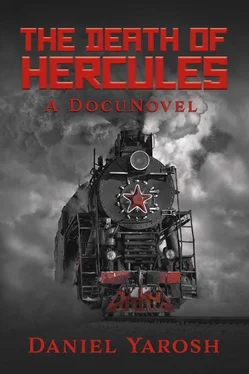It was typically gray, and the weight of the world pushed the clouds low. The eastbound train from Lille was not crowded; few dared to cross the new boarder and into the demolished Germany on that day. A mixture of raggedy merchants, unarmed men with tattered military uniforms, and old women with very young children stood on the platform. Max was one of the first on the train and he took a seat next to the window. Some boarded with heavy shoulders and baggy eyes. This was the trip they thought they would never have to take – back to Germany in defeat and lost opportunity. Some took the train with a different weary look: the drops of sweat on the forehead and upper lip, in the middle of a chilly winter. Max stared at them without embarrassment, to ensure that no one sat next to him. A few walked down the train aisle with handkerchiefs clutched to their noses, and heavy suitcases in their other hands.
Max’s cracked browning leather seat squeaked as the train rumbled, gathering speed slowly as it reached the edge of town. He heard a few dry and haggard coughs among the passengers as the train lurched through its gears. The aging engine passed over eastbound tracks untended during the war, finally reached a comfortable compromise between moving forward and coming apart, and the rhythm of the wheels took over Max’s soul. It was only then that a wave of helplessness fell down on him.
Doubts suffocated him like the low-hanging gas cloud that crawled over trenches and drove young soldiers to their knees wheezing. What was he doing? His sisters had been married off as soon as they turned 16. Now the brothers were gone from their family home for years. Maybe his mother had not survived the heartbreak, the loss, and the war. Max would be crippled with grief; maybe it was best not to know. He was on his own in America but was still too young to do without his Mamma. Shneer-Solomon was still a prime man and would no doubt have remarried. Would his father be forced to choose between his sons and his new wife? Max could not bear to have to choose between leaving and staying, between Kherson and America, again. He considered now that returning to Kherson may be like pissing on a campfire. He had to get out. Maybe now, before it got worse.
His countervailing vanity was his image of himself as the returning savior. He imagined surprising his Mamma and Pa in a glorious embrace. He would offer salvation. They would cast aside their life, their belongings, their lifelong friends, and flee with him to the train station. Would they? Could he get them home? Once his father was on the mission, no doubt he would take over. The fact that everything in Europe had changed would not stop him from assuming control in a world without rules. What would happen when Shneer-Solomon directed the escape?
How had Max come to ride this train? It was nothing the three brothers had said. They all understood that Mamma and Pa had to leave. Not to try would be a sin, a failing that they could never forgive themselves. Whether Shneer-Solomon and Ethel wanted it, their sons must offer them the new world, America. The brothers could not sleep without it. Now it was Max’s duty to transduce guilt, duty and obligation into the world of chaos, starvation and isolation. He never felt less able to do a job, not after a hundred piston-clogged, twisted-steel, bloody transports had been dragged into the motor pit.
Four rows up, across the aisle, he spotted someone who didn’t fit. Max could only see the fantastic flowing eruption of red hair that had come undone from her bun. A thin neck with pearl white complexion supported the light curls, and her skin was as translucent as shaved ice. He stared in a dream. After a moment, she suddenly turned around, with an anxious look and a dainty silk scarf held to her mouth and nose. Their eyes met for an instant, and Max lost a breath. Then she looked down the aisle, behind Max. The scarf fell from her face and a smile banished the concern from her brow. Her blue eyes glowed. Her face lit like a Chinese lamp, and dimples pinched her cheeks. Max had never before seen a young woman’s smile reveal her heart.
Before he could turn around, a tall, large man strode down the aisle with a commanding gate. He wore a long, fine black wool overcoat, and a black fedora hat. His bushy black beard with streaks of gray was perfectly matched to his winter wear. Shiny boots made authoritative footfalls as he approached the red-headed beauty. He slid onto the seat beside her, and she pecked him on the left cheek, shooting a short glance directly at Max, he was sure. The man wore a yarmulke , just barely visible under the hat.
Max was sickened. Why was everything so wrong? Despite the victory of the new Americans, these people still cling to the old order, the dominance of customs and ancient traditions in the face of modern changes. What had this man done to deserve her attention? He and his generation had destroyed everything they had and took the next generation down with them. This is what he and his brothers had fled to America to escape.
But after a pause Max knew that he wasn’t really angry at the man. No, he didn’t like him, but he could not stop looking at the woman. She had a rosy glow that seemed to be fueled by her flaming hair. She had soft, round eyes that could never lie. Max was used to thinking that such girls were easy, since red hair was considered a sign of a shikseh (un-Jewish) among Jews of Eastern Europe, and their fathers found them particularly hard to marry off. He was thinking that the older fellow was taking advantage of her, flattering her, but out to do her no good. He could see that she was sincere, and vulnerable, and he instantly wanted to take care of her.
After an hour of Max’s furtive glances, nervous fidgeting, and lack of concentration, the red-haired woman leaned over, turned her head full to Max, and whispered in her companion’s ear. A pit formed in Max’s stomach and his legs turned to lead. In a moment, the man turned to the woman with a pinched brow, and then turned to stare at Max. Now Max was in panic. Can thoughts bring us to ruin? Most probably. The man rose, turned into the aisle, and walk back. At Max’s row he stopped, turned to the calcified soldier, and said in French “I beg your pardon, may I sit here?”
With great composure, Max nodded yes, and turned his head to the window, as if he was resuming a serious observation. The man gave a short laugh at him.
“My name is Zalmund Hofitz,” he said in French. “I am from Koszuty, near Poznan in Poland.”
No response from Max. Zalmund took in his youth, freshly cleaned peasant shirt, that he didn’t respond in French, and that he boarded the train in the military stronghold of Lille.
“Have you been out of the service long?” he continued in English.
At this Max turned to look at Zalmund but did not yet reply. He could not understand why Zalmund switched from French to English, or how Zalmund knew he was from the military. His fundamental belief that he could pass through Europe and into the Ukraine, blending into the scenery, and quickly retrieving his parents, was shattered before the train reached the first stop on the first day.
“Just a few days,” he said. He tried to be casually secretive. But there was something about Zalmund’s flashing dark eyes over a mature beard that made Max feel that his whole soul was known at that moment. In a strange way it was comforting to Max to have someone to lift the loneliness. Then he remembered the red-headed girl.
“I am headed east myself, for a long way,” Zalmund said, leaving open the obvious question: Why is an American serviceman also headed east?
“Going back home?” Max asked, relieved that the discussion was not turning to some offense he may have committed by staring at his woman.
Читать дальше












